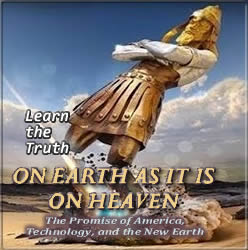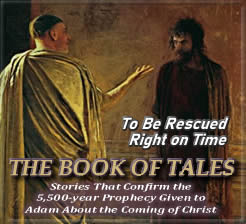The Hidden Books
This Journey of Discovery
In a world where evil so often triumphs over good, several burning questions linger in the face of such tragedy and despair. Is the God of The Bible really in control of human history as the Scriptures declare? And if He is, does He actually keep His promises to mankind? Fortunately for us, these first two questions are inexorably bound together, and they are bound in the following manner. God’s control over history is clearly confirmed in direct proportion to His faithfulness to the promises He has made to humanity. In other words, in order to verify that God is in control, all one need do is confirm that He is faithful to the promises He makes. This then leads us to the next question, which is: Where does one look to confirm God’s faithfulness to His word of promise? Naturally, the obvious solution to a problem framed this way would be: I guess one finds the answer in The Bible, right? Needless to say, though, as both believers and skeptics have discovered, such a straightforward solution is much more elusive than that. To begin with one must first ask: To which promise of God should one look in attempting to confirm this faithfulness? And having decided upon which promise, how does one go about establishing a clear-cut way to determine whether or not God has kept that promise?
To that end, it would be useful to focus our quest. By that I mean that, out of the countless promises that fill the pages of Holy Writ, it would help if we could narrow down our choice. Fortunately, we do have the Apostle Paul to assist us in this matter. Speaking of Jesus, in his letter to the Corinthians, Paul said, “For all the promises of God find their ‘yes’ in Him.”1 Or as Weymouth’s New Testament puts it: “All the promises of God, whatever their number, have their confirmation in Him.”2 In other words, if one were to gather together every promise that God has ever made to His people, they could all be confirmed by the fact that His Son came into this world to live and die and resurrect just as had been predicted. Therefore, if this Advent of Christ can be adequately confirmed, then—based on this verse in Corinthians—every other promise in the book can be counted on as well.
Story Continues Below
Says Richard Price—the founder and CEO of Academia.edu—on his podcast In Depth With Academia:
Tales of Forever: The Unfolding Drama of God’s Hidden Hand in History is:
To hear Price’s book review of Tales of Forever, CLICK HERE.
To hear Kent, Zen Garcia and S. Douglas Woodward as they continue their discussion concerning the implications of the 5,500-year prophecy spoken of in various apocryphal sources and confirmed via the chronology of The Septuagint, CLICK BELOW.
Story Continues From Above
That said, it should be the mission of every student of Scripture to determine the extent to which the promises of God have been fulfilled in the Incarnation of Christ. Admittedly, this is not the easiest thing to do, considering all the roadblocks that stand in the way of one’s quest for historical certainty. However, just because it is a difficult task does not mean that it is an impossible one. After all, although there are many pitfalls along the way, the God of The Bible does not hesitate to beckon us onward in this journey of discovery. Therefore, if one can appreciate that it is God Himself Who is guiding our quest, then it should come as no surprise that He is also the One Who has provided sufficient signposts to help us along the way.
With this in mind, then, one simply turns to the various ways in which The Bible portrays the manifestation of Christ in history, right? To which I must confess that—for me, at least—this is where things get a little tricky. Let me take a moment to explain what I mean by that.
A Body of Wisdom
Naturally, speaking as I am from an admittedly Christian frame of reference, I do look to The Bible as one of several sources for such evidence—that is, the traditional Bible. But notice how I said the traditional Bible. The reason I say that is because after more than thirty years of research, I have become convinced that there is another source of God-inspired wisdom that is just as capable of confirming the truth of the divine promise concerning the Advent of Christ. Make no mistake, though, I am not referring to any literary source that has not, at one point or another, been considered part of Holy Scripture. On the contrary, what I am referring to are books that were once considered inspired by God but which have, over the course of time, been excised from the canon of so-called “accepted texts,” generally for reasons that seem more motivated by the whims of politics than by the dictates of conscience.
I am, in fact, referring to an ancient body of wisdom literature that has come to be known in modern parlance as the pseudepigraphical books of The Bible. Pseudepigrapha—chances are if you are neither a biblical scholar nor an archeology professor you may not even know what this word means or what it implies. According to the dictionary, the word is derived from two Greek words, pseudo, which means “false,” and epigraphein, which means to “inscribe,” thus, “to write falsely.” By that definition, any book considered pseudepigraphical is one that is believed to be a “falsely attributed work,” that is to say, a work that erroneously purports to be written by some noteworthy biblical personage. As such, any book labeled as pseudepigrapha is to be discounted as being outside of the canon of books that have been deemed truly inspired by God. In addition to labeling these books as pseudepigrapha, they are designated as “apocryphal” literature because a number of these titles remain in a separate section of the Catholic and Greek Orthodox Bible called the Apocrypha. Among these books are the Wisdom of Solomon, the Epistle of Jeremiah, the Prayer of Manasseh, Judith, and Second Esdras.








